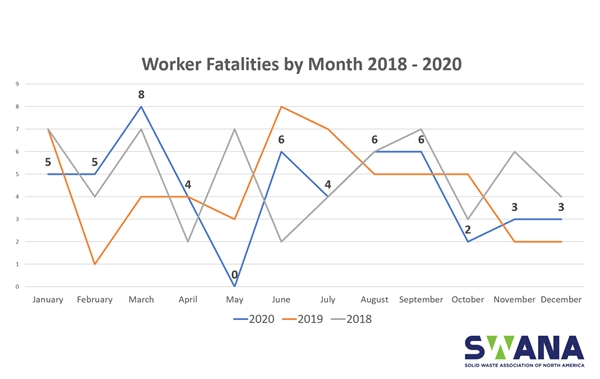Weekly News Bulletin: Mar. 5-11, 2021
SWANA Says Vehicular Accidents Still Leading Cause of Death

The Solid Waste Association of North America (SWANA) has reported that 52 municipal solid waste industry workers were killed in 2020. Nearly 70 percent of these fatalities happened during waste collection. The most common cause of death was related to single vehicle accidents. In comparison to 2018 and 2019, fatalities at landfills and material recovery facilities (MRFs) both decreased, however, transfer station deaths increased.
Of the incidents related to single vehicle accidents, many occurred while the driver was out of the cab, which suggests that worker rush may have been a factor at play. Also, very disturbing is that 76 members of the public were killed in accidents with collection vehicles...Read More »
Biden Energy Secretary Eyes Big Green Energy Investment

Jennifer Granholm, after being confirmed by the Senate as the newest Secretary of Energy, has announced that she will be re-activating $40 Billion allocated by Congress to use for loans for businesses in the energy industry. She, as well as the Biden administration, hope to use that money to push the US grid in a greener, more modern direction.
One of the major reasons behind the urgency of the Biden administration's push to reinvigorate the grid is that the US economy is changing quickly. With more electric cars on the road and online activity increasing, the demand for electricity is rising quickly across the country. In order to meet this growing demand with renewable sources of energy, money will have to be invested soon...Read More »
The Value of Recovered Materials Surged in Late 2020

According to Northeast Recycling Council (NERC), the blended value of one ton of materials marketed at material recovery facilities (MRF) rose over 20% in the final quarter of 2020. When the cost of residuals was factored in, the price rose 29%. Without residuals, the price rose 23%. The cost of processing one ton of material also declined, down 5% in Q4 of 2020. Both figures are welcome news for MRFs, some of which struggled during the early stages of the pandemic...Read More »
Clean Harbors' Q4 Performance Helped by COVID Work
| Clean Harbors, Inc. (CLH) | ||
| Three Months Ended Dec. 31 | ||
| (millions of $) | 2020 | 2019 |
| Revenue | 796.2 | 871.0 |
| EBITDA | 136.1 | 132.2 |
| EBITDA Margin | 17.1% | 15.2% |
| Net Income | 39.3 | 24.2 |
| Year Ended Dec. 31 | ||
| (millions of $) | 2020 | 2019 |
| Revenue | 3,144.1 | 3,412.2 |
| EBITDA | 555.3 | 540.3 |
| EBITDA Margin | 17.7% | 15.8% |
| Net Income | 134.8 | 97.7 |
Clean Harbors, Inc. (Norwell, MA), reported fourth quarter earnings of $39.3 million, or $0.71 per share on revenue of $796.2 million. "While Q4 is typically a seasonally weaker period for Clean Harbors, our revenue grew nearly $17 million sequentially from the third quarter as some of our end markets continued their recovery from the pandemic," said Alan S. McKim, chairman, president and CEO. "Our performance in the quarter was again led by our Environmental Services segment, where we achieved better-than-expected results due to a combination of high-value waste streams in our disposal network, strength in COVID-19 decontamination work and ongoing cost controls." That yielded a 16 percent price per pound increase in the last quarter. Revenue from COVID-19 decontamination work totaled $31 million in the quarter, reflecting the late-year surge from the pandemic, with the company completing nearly 14,000 COVID-19 responses in 2020. Full-year revenues were $3.14 billion compared with $3.41 billion in 2019...Read More »
J&M Sanitation Deploys Electric Refuse Trucks

J&M Sanitation, a family-owned business in Kuna, Idaho, has deployed two electric waste collection vehicles. These two vehicles are two of just ten across the nation. The development of electric waste disposal trucks represents the earliest steps of what could be a major shift in the waste industry nationwide.
The vehicles are state of the art, weighing less than conventional trucks with more efficient features and top of the line parts. They are able to hold a charge for an entire day's worth of routes. They also drive more quietly and smoothly than conventional trucks. While the cost of these vehicles is certainly a barrier for many firms across the country, rising gas prices and pressure from activists and governments could soon spark a greater trend of firms replacing diesel vehicles with electric ones...Read More »
Sign up to receive our free Weekly News Bulletin